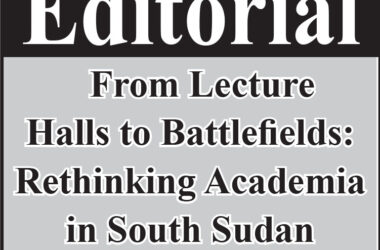By Agar Mayor Gai-Makoon
There is something particular about our public service. Our experts get unusually transformed when they get to public posts. They forget the appropriate demands of their profession and the public. Instead, they turn a deaf ear to the great calling, and continue to just occupy the positions.
I am not quite sure about what really happens there. But what I am certain about is that there is a transformative power in our public service. And it is bad news that this power must be very powerful. It has the ability to influence and divert public interests and demands to its own benefit.
Many ministers have always talked about this challenge when they are relieved from their positions. For instance, yesterday, in his farewell speech, Hon. Dier Tong Ngor cautioned the incoming minister of Finance about the tough challenges that he is likely going to encounter. One of them is the power play. In this game are minister, appointing authority and powerful businesspeople. The minister tries all ways to stay in the position and in the process; there is possibility of compromising even the most needed policies that could propel ahead our financial sector.
The businesspeople have enough money and influence. Surprisingly, they do not have legally existing businesses. You can’t find their companies and investments with appreciable number of employees anywhere across the country. So, they are neither corporations nor limited liability companies so that the state can legally tax neither them nor nonprofit organizations with tax-exempt status. Nevertheless, these powerful people exist in the business realm and are able to influence and pin the financial system and policies to their advantage. They procure government contracts and undeserved checks. And whether they fail or properly execute the contract demands, they are not a subject to anyone or authority. This has always been the order in our ministry of finance. The ministers always have to conform to the order of this invisible establishment. And for this reason, our financial system has suffered corruption and debts due to huge public expenditures for the last twelve years and counting. The skills of our distinguished business experts will continue to be lost to this establishment.
The provisions of article 101(r) and (s) of the transitional constitution concentrate political power in the hands of president. He has the power to remove anyone including governors in time of crisis and appoint people of his choice. This has created a space for lobbies in which someone who has done his double-dealing well wins trust of the president. In this way, there is no way to escape the influence of powerful men.
As we hope for the turn of events, the only solution to this mess and killing of skills will be empowerment of the labour and public service. The labour act has to be revised, amended and fully implemented. The processes of employment and deployment in the public roles have to be defined, refined and systematic. Public service has nothing to do with politics of deceit and blackmail. Instead, it is about what you are able to do in a specific institution with required skills and qualifications, and with space and freedom to execute the expected roles and policies. I pity our distinguished experts who get employed during these times when politics outbalance service. Technocrats have no time for lobbies and blackmail. They do their work with diligence, passion and always care about the outcomes of their labour. And this is why there should a well-defined system that they should work under—a system that is fair, just and that knows who or not to promote.
The writer is former contributor to Juba Monitor



